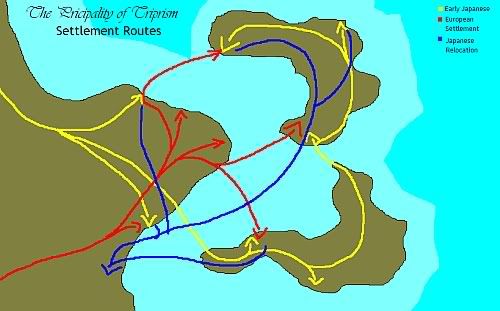Triprism

| |
| Flag of Triprism | |
| Motto: E amor patriae | |
| Map | |
| Region | Continent of Salutant |
|---|---|
| Capital | Lex Loci, Isle of Dictu |
| Official Language(s) | English, Japanese (Minority, In Some Areas) |
| Leader | Liberal Activist President John Cassidy |
| Population | ~10,000,000 |
| Currency | 1 Tri = 50 Point |
| NS Sunset XML | |
E amor patriae, we island Nations hereunto bind ourselves to this written Law for the greater Good and advancement of Society.
- For the latest news: The Triprism Times
- For all information regarding Triprism: Category:Triprism
Contents
A Little Piece of Serenity
The Principality of Triprism is made up of two islands and a rather large peninsula on the Continent of Salutant, much of which is not developed. The Peninsula, called Literati, and the two islands -- respectively called Dictu and Visu, form somewhat of a triangle, with Literati on the West and the Islands bordering it on the east. Visu, the southernmost and therefore warmest area of Triprism, is connected to Literati by bridge, and Visu is then, in turn, attached to Dictu via bridge. This system is collectively called the Trans Mare System, concieved in 1958 but only recently put into place. The several million residents of Triprism use this System everyday, and it is the backbone of the island system. The Government is very liberal, and crime is considerably low. Triprism is a jewel in the eye of the ocean, and we hope to see you soon.
A Brief History

Triprism was initially settled in 1789 by Japanese colonists from the East. The YELLOW arrows on the map at left symbolises Japanese settlement routes. The largest arrow represents where Lex Loci, Triprism's capital, now resides. The Japanese lived independantly in Triprism until 1852, when English settlers set up colonies in Triprism, firstly on the Penninsula, then later on the Islands. It appeared that the English and Japanese would live in peace, but a series of bloody conflicts in 1863 and 1864 caused the Japanese Relocation (marked by blue on map) by the English (who were at the time under English rule) to the now sprawling city of Megami in the southern part of the Literati penninsula. Finally, in 1903, after increasing tension between England and the settlers, the Japanese disregarded their differences and banded with the English to declare independance. Megami mayor Kura Sakahari and Dictu Governor (a no-longer existing position) Fredrickk Averhill drafted the original Triprism Proclamation of Independance and signed it in convention with 23 other governors and representatives. England peacefully granted Triprism it's independance within the year, and plans to draft a Constitution were made. In 1916, Triprism held it's first National election, in which case the Liberal Economist candidate Harrold Ballantyne beat Moderist candidate Manson Warwick by a vote of 64% to 32%. (4% of ballots were not counted because the ship taking ballots to the capitol in Lex Loci for counting took damage on a reef and lost a few crates of ballots). Triprism has since been very peaceful and has taken on the personality of a very free and liberal nation. Now a popular tourist destination (mostly Visu) and an interesting Uranium mine in north Literati, the story of Triprism continues to unfold.
- Ocean's Jewel, a History of the Principality of Triprism is in the works.
Government
Triprism is declared a principality but is a Republic at heart. In the 88 years that the national Executive position has been in existence, all but one of them -- President Marcus Innis (least popular Triprism president ever) -- has been a liberal politian in at least one sense of the word, and Triprism residents enjoy very free civil liberties as a result. The government is divided simply, with a body of 24 Legislators representing each of Triprism's 12 States (essentially large counties) called the Midhouse, and the Executive offices making up the Upperhouse. The govermental heirarchy goes as such: President > Underpresident > Midhouse Majority Leader > Secretary of Affairs > Secretary of Relations > Secretary of Defense > Grand Judge > Secretary of Economics. Presidential Elections are held every four years, and winners are determined by the popular vote. Results are reported on a state-by-state basis until all tweleve States have reported and a full count is available. Midhouse elections are held every four years as well, but always spaced two years away from the presidential elections. Gubernatorial elections are held on Presidential years. Triprism has a multi-party election system, conprising of the Independant Party, the Liberal Activist party (evolved from President Ballantyne's Liberal Economist Party) and the Moderist Party. The Independant Party currently holds a 17-7 majority in the Midhouse, and the past three Presidents have been Independant. Research shows that Triprism is heading in the direction of being entirely non-partisan altogether, but this is far off. The Liberal Activist Party is by far the most liberal of Triprism's three major parties, and the Moderists are a step down. Several minority parties exist, the most famed being the Conservatist party, accused of stealing the 1992 elections away from the LA party.
Division of National Affairs
A broad Division, headed by Secretary (I) Julian Prudence, the Division of National Affairs essentially deals with all issues within the nation. The DoNA is also responsible for proposing bills to the midhouse.
Division of International Affairs
Headed by Secretary (LA) Allen Amherst, it is responsible for all International Relations.
